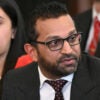“It made me feel like I wasn’t human. It made me feel like a criminal.” That’s what Fourteen-year-old Ahmed Mohamed, said after police handcuffed him and brought him to a juvenile detention center for mug shots, fingerprints, and interrogation; all because he brought his home-made digital clock to school to impress his teacher.
This is a pic of the device Irving police say they found on the student. @CBSDFW pic.twitter.com/WNKMew783W
— Jennifer Lindgren (@JLindgrenCBS11) September 16, 2015
Out of context, this device looks like an immediate threat. That is why, as the South African Jurist Lord Steyn declared, “In law, context is everything.”
In context, this clock is the harmless brainchild of an innocent young inventor. Ahmed appears in a few pictures and videos surrounded by wires or toying with his other playful inventions. His 15-year-old cousin and middle school robotics teammate, Muram Irbahim, told The Washington Post: “It just shocked me that people could do this to him. He’s a 14-year-old boy, and he’s a genius.”
But teachers and school administrators believed his clock was a “hoax bomb.” They called local police, who handcuffed the boy, seized his clock and tablet, and hauled him away to a juvenile detention center. Once in custody, he was fingerprinted, photographed, and interrogated.
As Ahmed recalls: “I tried making a phone call to my father. They said, ‘You’re in the middle of an interrogation. You can’t have a phone call. . . . I really don’t think it’s fair, because I brought something to school that wasn’t a threat to anyone. I didn’t do anything wrong. I just showed my teachers something and I end up being arrested later that day.”
Ahmed’s lack of intent to “do anything wrong” begs the question at the center of national debate over mens rea reform, because innocent-minded people shouldn’t be hauled to police stations for harmless conduct. The details of his case have elicited a public outcry on his behalf.
“MythBusters” cast member Grant Imahara called this “[a]bsolutely tragic. When I was his age, I took everything apart too and tried to make things.” NASA systems engineer Bobak Ferdowski added: “I can’t imagine [I‘d] be working [at] NASA today if anything like this had ever happened to me.”
This incident has received even more powerful reactions.
President Obama posted a message to Ahmed: “Cool clock, Ahmed. Want to bring it to the White House? We should inspire more kids like you to like science. It’s what makes America great.”
It is absolutely wonderful that our nation’s most powerful politicians are showing support for the young engineer. But it should not take an outpour of soft power from the president of the United States to stop a criminal investigation of a boy who made a clock.
The Dallas Morning News reports that Police Chief Larry Boyd announced “charges won’t be filed against Ahmed Mohamed,” and the police reaction “‘would have been the same’ under any circumstances. . . . We live in an age where you can’t take things like that to school, . . . [because] we’ve seen across our country horrific things happen, so we have to err on the side of caution.”
Caution is indeed necessary here. The potential harms are far too serious to ignore. But prudence has limits. So does the justifiable application of criminal laws.
The incident illustrates a national trend towards overcriminalization. As The Heritage Foundation’s Paul Larkin, and John Malcolm write,
“The use and abuse of the criminal law instead of civil or administrative law to “solve” every societal problem and punish every mistake. The criminal law should be used to redress only blameworthy conduct, actions that truly deserve the greatest punishment and moral sanction.”
School administrators have an incredibly important duty to keep schools safe, but it should still be the purview of teachers and parents, not the criminal justice system, to correct innocent mistakes of children.
At least for Ahmed Mohamed, NASA systems engineer Bobak Ferdowski added this silver lining: “Hey Ahmed, give me a call in a couple years. We could always use smart, curious & creative people.”































